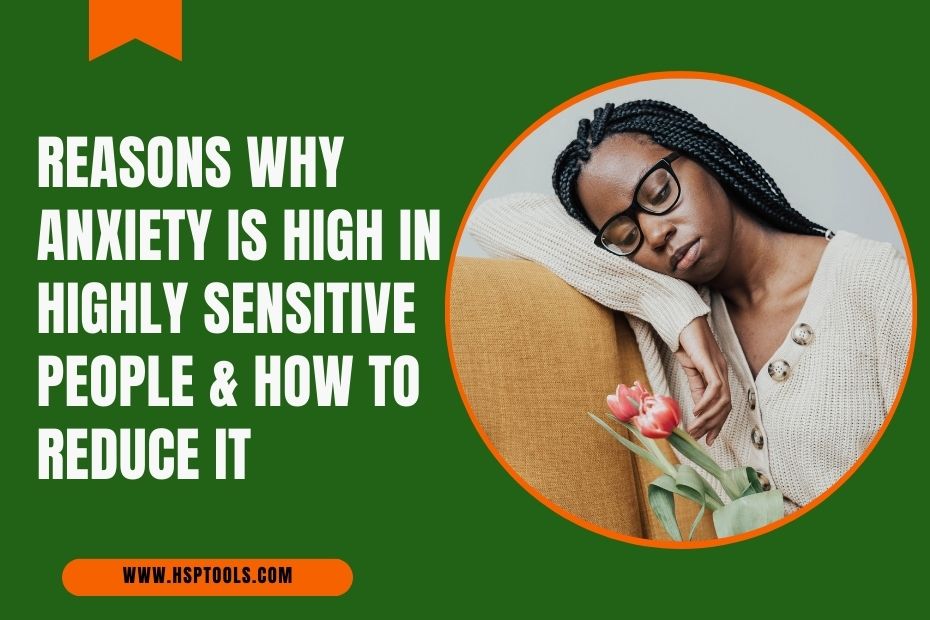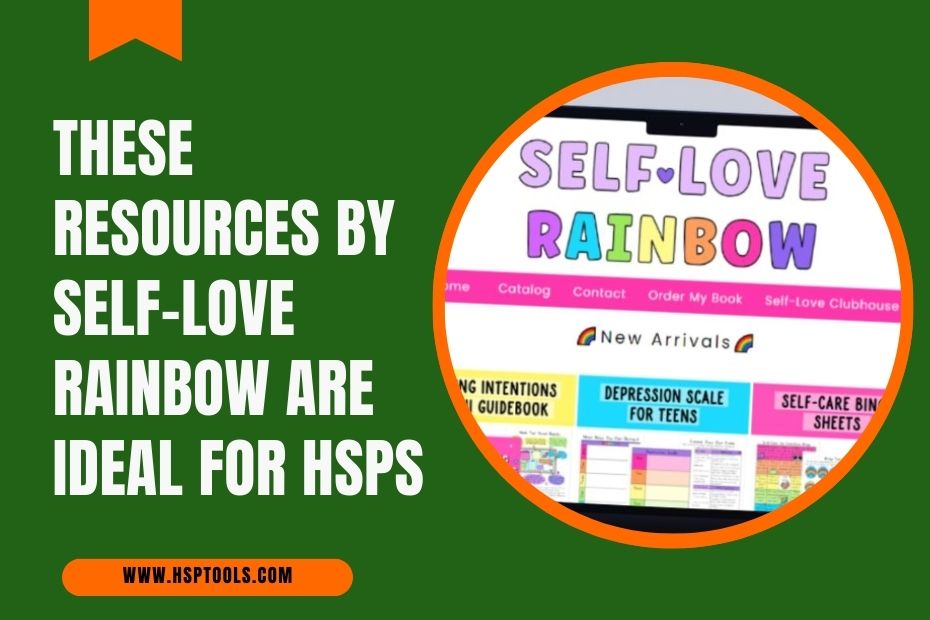In Psychotherapy and the Highly Sensitive Person, Dr. Elaine Aron says this about high sensitivity:
“Individuals display this trait mainly if they had a troubled childhood, which makes them more prone than non-sensitive persons to depression, anxiety, and shyness.”
But why is this so?
Why is it that you, a Highly Sensitive Person (HSP), are prone to depression and anxiety?
This post shares five reasons why Highly Sensitive People (HSPs) are more likely to suffer from mental health issues such as depression and anxiety.
And before you can even ask, no, it’s not because they are weak or broken.
5 Reasons HSPs are Prone to Depression and Anxiety

1. You Process Information Deeply
Highly Sensitive People (HSPs) possess a trait known as Sensory Processing Sensitivity (SPS), or High Sensitivity.
At the heart of this trait is the ability to process information deeply – the first and most notable of four characteristics shared by all HSPs and summarized with the DOES acronym.
- Depth of Processing,
- Overstimulation,
- Emotional Response & Empathy, and
- Sensing the Subtle.
Because of this depth of processing, HSPs have an increased sensitivity when interpreting information. As a result, they are at risk of high stress and mental health issues.
Research shows that many HSPs tend to suffer from anxiety, depression, insomnia, social phobia, attention deficits, and decreased memory.
2. You Are Easily Overwhelmed
Depression is a mood disorder that intensifies or lowers someone’s emotions to the point of affecting their daily life. Anxiety, on the other hand, involves intense feelings of worry, fear, and nervousness that interfere with everyday life.
As an HSP, especially if you’ve grown up in an environment that shames sensitive people, these intense emotions can become a daily struggle, often leading to constant overwhelm.
“If you notice everything, you are naturally going to be overstimulated when things are too intense, complex, chaotic, or novel for a long time.”
– Dr. Elaine N. Aron
If these intense feelings are left unchecked or untreated, they could lead to anxiety disorders or mood disorders. This is primarily due to an overload in the D, O, and E aspects of being Highly Sensitive (Depth of Processing, Overstimulation, Emotional Responsiveness, and Empathy).
Below is an excerpt from a research study for reference:
“Sensitive individuals have a higher emotional response and in-depth processing ability. This not only leads to stronger reactions to both positive and negative feelings but also, when they receive too much stimulation, can result in greater stress, potentially leading to anxiety and depression.”
3. You Fall Short of Resilience
The Oxford Dictionary defines resilience as the capacity to recover from difficulties, equating it with toughness. The Collins Dictionary describes resilience as the quality of being strong and not easily damaged by hardship.
If you’re a Highly Sensitive Person, there’s a good chance you’ve been shamed for being emotional or fragile. Society often pressures people to be “tough” or “strong,” two qualities closely tied to resilience.
But as an HSP, you aren’t necessarily born with the ability to bounce back from life’s challenges easily. Resilience is a learned skill.
In fact, only a few people are born with natural resilience. It’s not because they are inherently resilient, but because they possess other traits that allow them to adapt more easily.
According to Jack Shonkoff, Center Director at Harvard:
“Resilience depends on supportive and responsive relationships and the mastery of capabilities that help us respond and adapt to adversity in healthy ways. These relationships and skills can turn toxic stress into tolerable stress.”
This means that if, as an HSP, you grow up in a supportive environment, you’re more likely to be resilient.
Conversely, if you’re made to feel weak or abnormal, you’re likely to struggle with resilience, increasing your risk of depression, anxiety, and other mental health issues.
4. You Struggle with Self-Compassion
In a sensitivity quiz by Julie Bjelland, one of the statements reads as follows:
“Even though you are highly compassionate toward others, you find it harder to be self-compassionate.”
Highly Sensitive People are often known for lacking self-compassion, not because they want to be, but because they haven’t learned to be kind to themselves.
Take the song “I Love Me” by Demi Lovato as an example, where she sings: “I’m a black belt when I’m beating up on myself, but I’m an expert at giving love to somebody else.”
This sentiment perfectly describes how HSPs, who haven’t yet learned to prioritize self-love, often feel.
Without self-compassion, you struggle to forgive yourself when things go wrong and instead blame, criticize, and beat yourself up, never giving yourself a break.
Self-compassion is the ability to be kind, accepting, and understanding toward yourself in times of suffering, inadequacy, or failure. Without this ability, HSPs become more prone to depression and anxiety.
5. You Buy into the Myth That Sensitive People Are Weak
Being sensitive is not the same as being weak.
For a long time, society has equated sensitivity with weakness. People often tell HSPs to “be strong,” “toughen up,” or stop being “too sensitive” or “dramatic.”
But here’s the thing:
“Like many things in life, being a highly sensitive person is both a blessing and a curse. It all comes down to what you make of it.”
— Dr. Travis Bradberry
This means that being highly sensitive can be a strength and a weakness, just like any other trait.
When HSPs buy into the myth that sensitivity equals weakness, they focus only on its negative aspects, which can lead to low self-esteem – a significant catalyst for depression and anxiety.
Yet, being sensitive is far more of a strength than a weakness. In fact, according to Dr. Elaine Aron:
“When the trait of high sensitivity is harnessed, HSPs can be just as strong as — or even stronger than — non-HSPs.”
It all depends on the environment you’re raised in and how well you understand and accept your sensitivity.
Final Word on Why HSPs are Prone to Depression and Anxiety
These five reasons are by no means exhaustive but are intended to explain why Highly Sensitive People are more prone to depression and anxiety compared to non-HSPs.
As research shows, HSPs make up a large proportion of patients seeking therapy. Yet, not many mental health professionals understand the need to tailor treatment approaches for HSPs versus non-HSPs.
Additionally, because many HSPs often feel misunderstood and struggle to understand themselves, they may mistakenly believe they have a disorder when they don’t.
Download this free PDF to learn more about the Highly Sensitive Person (HSP) trait and embark on a journey towards reducing your risk for depression and anxiety. It all starts with educating yourself!
More Posts You Might Like:
***
Did You Like This Post? HSP Tools is a reader-supported platform. If you love our work, please buy us a coffee or two. We will be forever grateful.




